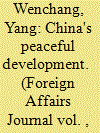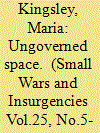| Srl | Item |
| 1 |
ID:
116396


|
|
|
|
|
| Publication |
2012.
|
| Summary/Abstract |
Today I wish to take this opportunity to make some opening remarks on China's peaceful development path and its significance for the world and I welcome your views and questions on this topic.
I. The domestic and international background to China's choice of the peaceful development path
1. China's choice of the peaceful development path is determined by its national conditions. Since the beginning of China's modern history, in particular after the Opium War, China was divided up by Western powers and reduced to a semi-colonial and semi-feudal country, lagging behind economically. While the Western countries were already industrialized, China remained an agricultural country backward in politics, economy and culture. In about half of the time of the 20th century, the Chinese people suffered from internal wars and foreign aggression and fought to overthrow monarchy, resist invasion and achieve national independence. Today, peace, stability and development are the common aspirations of the 1.3 billion Chinese people.
|
|
|
|
|
|
|
|
|
|
|
|
|
|
|
|
| 2 |
ID:
146180


|
|
|
|
|
| Summary/Abstract |
Why do internal wars start anew after they apparently end? I argue that rebel arrangements made for strategic reasons during wars sometimes create provocative effects even after conflicts end; coalitions formed between opposing groups during conflicts often precipitate disruptive commitment problems at the end of wars. This competition can abet the conflict renewal process, especially after wars terminating in military outcomes. Using new data on competitive militant alliances in civil wars, this study probes how rebel rivalries impact peace duration after wars. The evidence indicates that rivalry within coalitions shortens the period of postconflict peace. Wars ending in military victories give way, as many scholars argue, to lengthier periods of peace. But this effect reverses in the context of conflicts characterized by competitive alliances. Indeed, the combination of competitive alliances and a military victory strongly precipitates a resumption of hostilities. This perpetuation of the “conflict trap” proves especially pronounced when rebels win wars. My study implies that peacekeeping or third party forces may find the least local consent for their presence precisely where they matter most in post-conflict environments. As former work has shown, victorious rebels, having wrested power by force from vanquished governments, have relatively little desire for outside interference.
|
|
|
|
|
|
|
|
|
|
|
|
|
|
|
|
| 3 |
ID:
134174


|
|
|
|
|
| Publication |
2014.
|
| Summary/Abstract |
The Ecuadorian state has long been absent from the regions along its northern border with Colombia. I argue that this lack of state presence has allowed non-state armed groups and criminal organizations space to not only operate from these areas, but also, to challenge and change the relationship between local populations and the Ecuadorian state. After reviewing theoretical approaches to concepts of changing security paradigms and ungoverned space, the article details the conditions that have allowed armed groups, specifically the FARC, to take advantage of the lack of state presence along Ecuador's northern border.
|
|
|
|
|
|
|
|
|
|
|
|
|
|
|
|